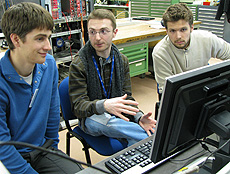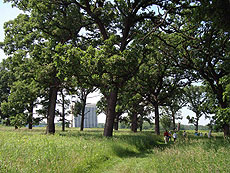|
Have a safe day!
Monday, Feb. 13
THERE WILL BE NO PARTICLE ASTROPHYSICS SEMINAR TODAY
3:30 p.m.
DIRECTOR'S COFFEE BREAK - 2nd Flr X-Over
4 p.m.
All Experimenters' Meeting - Curia II
Special Topics: Completion of Cryomodule-1 Tests
Tuesday, Feb. 14
Happy Valentine's Day!
2 p.m.
Joint Experimental-Theoretical Physics Seminar - One West
Speaker: Pierluigi Campana, CERN
Title: Recent Results from LHCb and Future Prospects
3:30 p.m.
DIRECTOR'S COFFEE BREAK - 2nd Flr X-Over
4 p.m.
Accelerator Physics and Technology Seminar - One West
Speaker: Henryk Piekarz, Fermilab
Title: Project X with Superconducting Rapid Cycling Synchrotron
and Superconducting Dual Storage Ring
Click here for NALCAL,
a weekly calendar with links to additional information.
Upcoming conferences
|
|
Monday, Feb. 13
- Breakfast: Croissant sandwich
- Smart cuisine: Potato leek soup*
- Monte cristo
- BBQ chicken breast w/ stuffing
- Alfredo tortellini
- Chicken ranch wrapper
- Assorted sliced pizza
- Szechuan style pork lo mein
*Carb-restricted alternative
Wilson Hall Cafe Menu
|
|
Wednesday, Feb. 15
Lunch
- Roasted chicken-artichoke calzones
- Spiced marinated tomato salad
- Pumpkin cheesecake
Friday, Feb. 17
Dinner
Guest chefs:
Francesco Pupillo & Donatella Torretta
"From South to North: An Italian Cooking Trip"
- Fresh ricotta cheese w/ oven roasted vegetables & sun-dried tomatoes
- Baked pasta w/ sweet peppers
- Braised pot roast w/ rich wine sauce & polenta
- Seasonal fruit
- Torta della nonna w/ crème anglaise
Chez Leon Menu
Call x3524 to make your reservation.
|
|
DOE stakeholders meeting streamed live from D.C. today
Energy Secretary Steven Chu will present the FY2013 budget request at 1:30 p.m. to DOE stakeholders. The meeting will be broadcast live on DOE's website. The broadcast will be archived online by Tuesday, Feb. 14.
|
Class begins for the first EDIT school at Fermilab
 |
|
CERN's Marco Villa, center, explains to EDIT students Peter-Bernd Otte, left, and Tom Barber, right, how to use a gas electron multiplier detector at CERN's EDIT school last year. Photo by Kathryn Grim
|
Called Excellence in Detectors and Instrumentation Technologies, this new series of international symposiums is exposing young researchers to hands-on particle detector experience.
From Feb. 13 through 24 at Fermilab, 64 EDIT attendees from around the world will work alongside detector professionals. The first morning starts off with a series of lectures. Among the speakers is the dean of American detector specialists, David Nygren of Lawrence Berkeley National Laboratory. Each of the following days begins with a brief lecture on particle detectors and experiments – all are open to the public.
The students, split into eight groups, focus on a different track each day. In one exercise, each student gets a time projection chamber to study, while another group compares real-time beam profiles in Fermilab's Test Beam Facility to computer simulations. The two other tracks, meanwhile, focus on silicon tracking detectors and solid state photo detection.
A series of tours will give a closer look at the MINOS Underground and NOvA areas, the Collider Detector Halls and several other facilities.
The new EDIT school has proven to be just as popular as the previous symposium at CERN. Erik Ramberg, Fermilab physicist and chair of EDIT's local organizing committee, said an overwhelming 205 applications were considered. For those unable to make this session, the next EDIT school will be held at KEK in Japan next year.
"This school will bring advanced detector design concepts to a new generation of particle physicists," Ramberg said. "That kind of experience can enhance their whole career."
—Brad Hooker
|
What the latest LHC revelations say about the Higgs
From New Scientist, Feb. 9, 2012
In December 2011, the elusive Higgs boson was back in the limelight when hints of the particle emerged in the wreckage of proton collisions at the world's most powerful particle smasher – the Large Hadron Collider (LHC) near Geneva, Switzerland.
There have been no new collisions since, but researchers from the LHC's two main detectors have given the existing data a more careful look, culminating in two fresh Higgs analyses released on Tuesday. Here New Scientist disentangles what we can and can't conclude about the particle that is swiftly becoming the people's favourite
Remind me: what was the scoop in December?
The Higgs boson is the missing piece of the standard model of physics, the leading theory for how particles and forces interact. The Higgs is thought to endow others with mass but has yet to be positively observed, so its mass – and existence – are still unconfirmed.
In December, the LHC's two main particle detectors, CMS and ATLAS, each reported excesses of events, such as the appearance of a pair of photons in the shrapnel from particle collisions. These excess events could be due to a Higgs with a mass of around 125 gigaelectron volts (GeV; particle masses and energy can be treated interchangeably).
Read more
|
Borexino Collaboration succeeds in spotting pep neutrinos emitted from the sun
From PhysOrg.com, Feb. 9, 2012
To learn more about how the sun works, scientists study particles that are emitted from it into space due to thermonuclear reactions that occur inside; by applying known physics principles, they can then deduce which sort of nuclear reactions are taking place. As one example, researchers have been able to identify high energy proton to proton interactions that are described as pp neutrinos by detecting them when they reach Earth.
Now, researchers deep beneath the ground in a mountain in Italy, working together in a group known as the Borexino Collaboration, have spotted the more elusive proton to electron to proton neutrino, a pep reaction that results in the formation of deuterium, a heavy form of hydrogen. To detect them, the team, as they describe in their paper published in Physical Review Letters, the team had to develop a method of filtering out virtually all other neutrinos, including those from outer space.
To detect the presence of neutrinos, researchers build underground facilities to use the Earth's natural filtering abilities to remove particle clutter. Then, they fill a big vat with a special kind of liquid that reacts with the type of neutrino they are looking for.
Read more
|
|
Savanna restoration in Main Ring to start soon
 |
|
Fermilab's iconic Wilson Hall can be seen in the background as visitors inspect savanna restoration efforts. Credit: Fermilab Natural Areas.
|
The highly endangered oak savanna was once one of the most common vegetation types in the Midwest. But during the surge of settlement in the 1840s the savanna gave way to the plow, and now less than one percent of Illinois' original savanna remains.
Thanks to a grant from the DuPage Community Foundation, one of those remnants, located in the center of the Main Ring, will be restored.
In December, the foundation awarded $7,500 to Fermilab Natural Areas to begin restoration of this 35-acre oak savanna.
The multi-phase restoration effort planned to start this winter will include removing invasive species of trees and shrubs, burning of selective areas, enriching of flora and a monitoring of the ecosystem. Typical savannas are very open woodlands, with less than 50 percent canopy cover, and diverse forb communities growing in the understory. Years of neglect have allowed the proliferation of many invasive tree species, such as cottonwood, ash and cherry. Also present are non-native plant species such as European buckthorn, multi-flora rose and honeysuckle.
Fermilab's record as an environmental steward is excellent, and includes the restoration of thousands of acres of prairies, woodlands and wetlands. This restoration would not be possible without the supplemental funding from organizations such as the DuPage Community Foundation. Since the initial grant was received, the Wiest Foundation, located in Naperville, Illinois, has donated an additional $2,000, and Davey Tree Service in West Chicago has agreed to donate a work crew to get the project started.
For more information on the project, email Fermilab Natural Areas or call 630-840-4845.
—Rod Walton, Fermilab ecologist
|
Correction: URA Visiting Scholars Program
Fermilab Today's Thursday, Feb. 9, article titled, "Call for Applications: URA Visiting Scholars Program," incorrectly reported that the program is a corporate commitment to Fermilab made by URA under the FRA contract with the Department of Energy. It is now a voluntary program under URA
The corrected article may be read here.
|
|